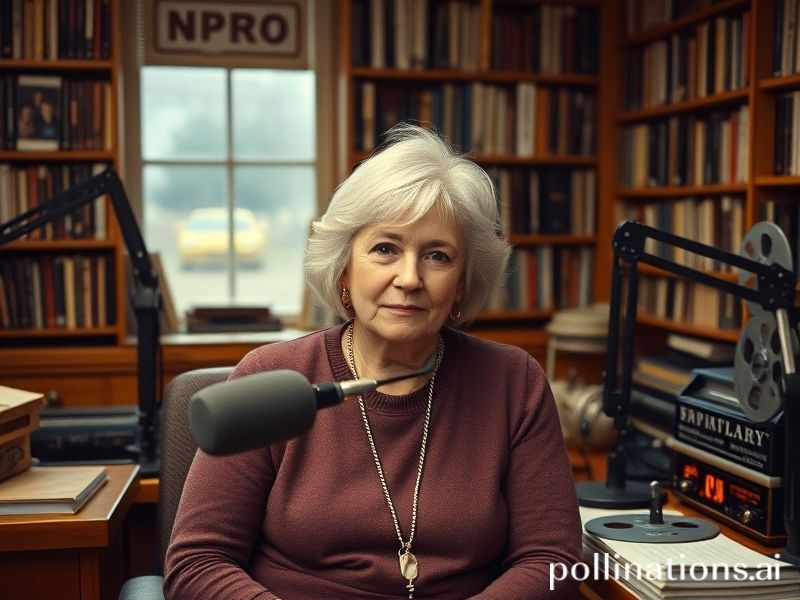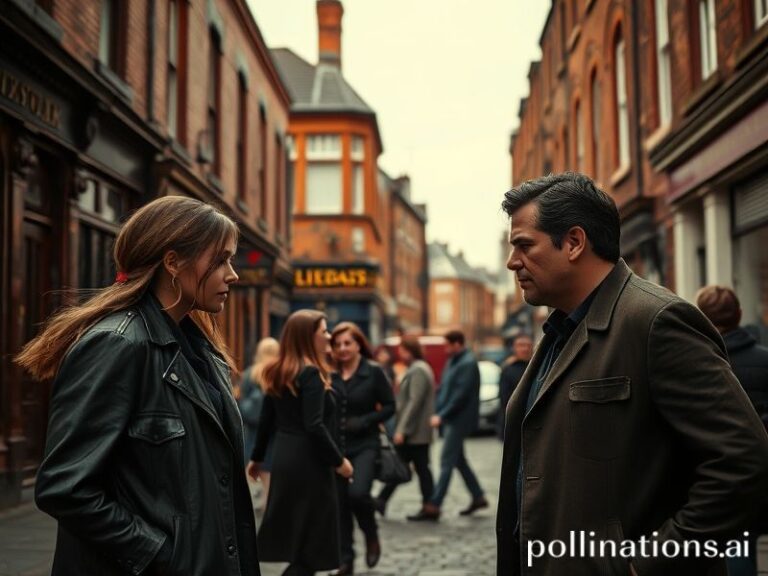Susan Stamberg: The Soft-Power Spy in Your Radio Silencing Dictators with Cranberry Relish
Susan Stamberg: The Velvet Voice Whose NPR Legacy Echoes Louder Than a Dictator’s Megaphone
By Dave’s Locker Global Desk
Listen closely on any given Tuesday in the souks of Marrakech, the karaoke bars of Seoul, or the all-night kafenios of Thessaloniki and you might still catch her: a soft, conspiratorial chuckle, a question that sounds like a secret, a pause so precise you could set your Swiss watch by it. Susan Stamberg—co-founder of National Public Radio’s “All Things Considered,” wearer of cranberry relish recipes like medals, and possessor of a voice once described by the BBC as “the audio equivalent of cashmere”—has, without ever holding elected office, invaded more international eardrums than most heads of state manage in a lifetime.
That matters. In an era when global leaders treat truth like a piñata and national media outlets increasingly resemble state-run karaoke machines, Stamberg’s four-decade experiment in civilized curiosity has become a rare contraband commodity: actual conversation. From Berlin to Bogotá, bootleg cassette compilations of her 1970s interviews still circulate like samizdat, traded by insomniacs who swear her gentle cross-examination of Henry Kissinger is the only known antidote to both authoritarian rhetoric and elevator music.
Born in Newark in 1938—thereby proving New Jersey’s capacity to export more than just industrial despair—Stamberg sidestepped the usual career conveyor belt for women of her era. Instead of typing pool to motherhood to martini, she marched straight into the boys’ club of broadcast journalism, armed only with wit sharper than a KGB letter-opener and a refusal to feign awe at anyone’s résumé. The result? A style so disarmingly intimate that world leaders forgot they were on the record and listeners from Lagos to Lahore felt personally invited to eavesdrop.
Her global footprint expanded exponentially once NPR began satellite distribution in the 1980s. Suddenly, a yak herder in Bhutan could hear her ask Philip Glass why he repeats himself so damn much, or catch her teaching the French Minister of Culture how to pronounce “cranberry” without sounding like he was gargling gravel. Each segment functioned as a miniature Marshall Plan for the mind: American soft power disguised as cocktail chatter.
Yet for all the velvet, Stamberg never flinched from the vinegar. During the Iran-Contra affair she grilled Oliver North with the polite relentlessness of an Italian mother asking why you haven’t married yet. When South African apartheid thugs tried to spin the Soweto uprising as “unrest,” she countered with a ten-minute montage of children’s playground songs—recorded clandestinely—turning state propaganda into sonic confetti. Dictators, it turns out, can ban newspapers, jam television, and throttle the internet, but they still can’t stop shortwave radio from slipping under the door like contraband perfume.
Which brings us to the present digital cacophony. TikTok tyrants pump out fifteen-second slogans while Stamberg still luxuriates in the long-form minute—an eternity in attention-span years. Her recent series on displaced artisans from Aleppo to Kyiv, stitched together from WhatsApp voice notes and Zoom static, plays like a lullaby for a burning planet. One listener in Reykjavik confessed on Reddit that he streams her 1978 piece on Soviet ballet defectors whenever the northern lights feel insufficient; another in Manila sets her 1993 chat with Nadine Gordimer as the soundtrack to Sunday ironing—domestic rebellion disguised as household chores.
So what, ultimately, is Susan Stamberg’s international significance? Nothing less than proof that curiosity can be smuggled across borders more easily than contraband uranium, and that a well-timed question is still the sharpest weapon in any language. While nations pour billions into cyber-meddling and influence ops, she’s spent fifty years demonstrating the cheaper, quieter art of simply asking—then actually listening. If that feels quaint, remember: the last time humanity tried shouting over each other without pause, we invented the Tower of Babel. Stamberg’s remedy is simpler, cheaper, and—crucially—doesn’t require divine intervention: just a microphone, a modicum of manners, and the radical notion that every story is worth the time it takes to tell.
In the end, perhaps the most subversive thing about her is that she’s still alive, still broadcasting, still insisting—against all evidence—that the world might enjoy a civilized chat. If that isn’t a form of quiet geopolitical resistance, then I’ll eat my shortwave radio. Hold the cranberry relish.







